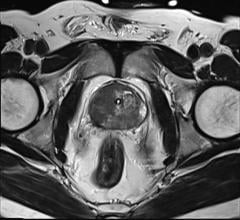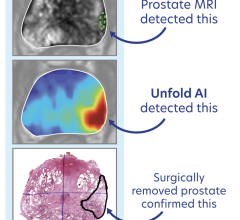![prostate cancer, [18F]DCFPyL, PSMA, biomarker, Johns Hopkins, WMIS](/sites/default/files/styles/content_large/public/Prostate%20cancer%20F18.jpg?itok=WPVhYiww)
April 30, 2015 — A first-in-human prostate cancer study in the Journal of Molecular Imaging and Biology showed initial safety, biodistribution and dosimetry results with [18F]DCFPyL, a second-generation fluorine-18 labeled small-molecule prostate-specific membrane antigen (PSMA) inhibitor. The imaging biomarker has been developed at Johns Hopkins University in Baltimore by study co-author Martin G. Pomper, M.D., Ph.D.
“This initial human evaluation of [18F]DCFPyL demonstrated a number of important findings. The radiotracer was safe, and parallels the expected uptake with significantly improved visual conspicuity of suspected sites of metastatic prostate cancer in comparison to our first generation radiotracer,” said Pomper, William R. Brody Professor of Radiology at Johns Hopkins.
[18F]DCFPyL is a second-generation small-molecule positron emission tomography (PET) agent that attaches to the PSMA. Signals from [18F]DCFPyL can then be measured via a PET scan. The study demonstrated that [18F]DCFPyL produced images that showed lower blood pool activity, providing clearer images than the first-generation agent, [18F]DCFBC, produced by the same group. The study also showed 50 percent lower radiation dose in the most sensitive organs.
According to the American Cancer Society, about 220,800 new cases and 27,540 deaths will occur from prostate cancer in the United States in 2015. While prostate cancer is often curable, there remain a large number of patients with residual, recurrent and metastatic disease who need imaging for lesion detection, therapeutic monitoring and restaging. Conventional imaging has not proven to be sufficiently sensitive and specific for detection of prostate cancer lesions.
“The basis of more accurate, molecularly-informed classification of disease is the premise of precision medicine and specific molecular imaging biomarkers are the keys to determine how we classify diseases, how we select therapy, how we monitor therapy, and ultimately how we make treatments more accurate for each individual for better patient outcomes,” said Jason Lewis, M.D,. Ph.D., professor and vice chair for research, Emily Tow Jackson Chair at Memorial Sloan-Kettering Cancer Center, and president of the World Molecular Imaging Society (WMIS). “We commend the team at Johns Hopkins for developing a more sensitive and accurate PSMA.”
For more information: www.wmis.org


 April 17, 2024
April 17, 2024 








